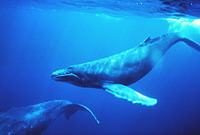International Whaling Commission starts meeting
Subsistence whaling has sustained Alaska native communities for centuries and renewal of their five-year bowhead whale quota is crucial.

"It is more than a right - it is an absolute necessity which affects every facet of their well-being," the Alaska Republican told delegates of the 76-nation commission. "To deny this history would jeopardize their way of life."
The meeting convened amid heightened security for the first annual gathering held in the United States in almost two decades.
Scores of anti-whaling activists were in Anchorage to monitor the four-day proceedings and lobby for increased protection for the marine mammals. They are keeping a close watch of important issues to be addressed, including the proposed renewal of bowhead whale quota for indigenous hunters, such as Alaska natives in 10 coastal villages.
The meeting is expected to end with a 21-year moratorium on commercial whaling formally still in place despite a symbolic resolution to overturn the ban that was passed at last year's meeting. A 75 percent majority would be necessary to end the moratorium, but the vote fell short of that mark.
Several anti-whaling members have since been added to the commission.
The moratorium was enacted in 1986 to protect several vulnerable species. Pro-whaling nations, including Japan, Norway and Iceland, argue that it is no longer needed because whale populations have rebounded. Norway and Iceland do not recognize the ban and conduct commercial whaling, and Japan hunts whales under a research provision allowed by the IWC.
Activists oppose a program in which Japan kills about 1,000 whales each year for scientific research and then sells the meat. Critics say the program is nothing but a loophole that defies the moratorium and should be better scrutinized by whale-friendly nations.
Japan also plans to seek "community whaling" status, which would give it quotas under provisions similar to those that allow Alaska natives and other indigenous groups to hunt the mammals. Japan has tried and failed to get quotas for more than two decades, according to Joji Morishita, the alternate IWC commissioner for Japan.
Japan contends that commercial whaling can coincide with environmental interests if done properly. The IWC needs to focus on managing the hunting of plentiful species rather than squelching a practice that has existed for thousands of years, said Morishita.
The meeting continues through Thursday.
Subscribe to Pravda.Ru Telegram channel, Facebook, RSS!





